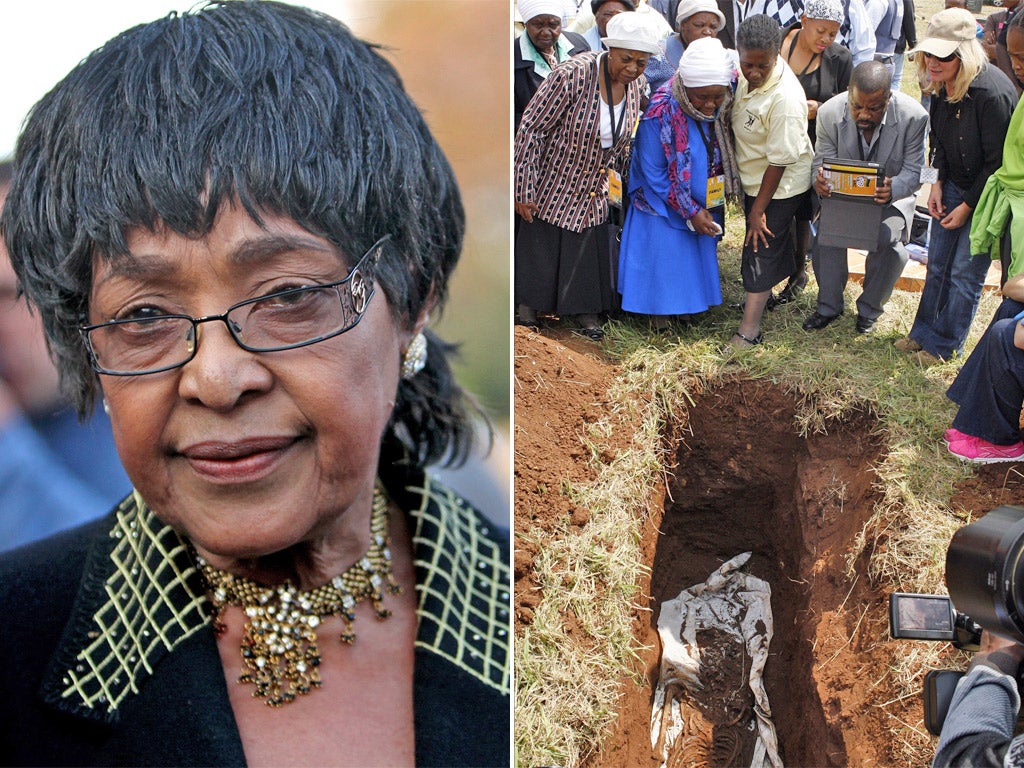Bodies exhumed in ANC 'murder' case linked to Winnie Mandela
Beloved president's ex-wife accused as corpses of missing ANC activists are identified

Prosecutors have exhumed two bodies in a Soweto cemetery and look set to open a murder investigation that will raise uncomfortable questions for Winnie Madikizela-Mandela, the ex-wife of former South African President Nelson Mandela. The bodies almost certainly belong to two former ANC activists who vanished more than 24 years ago and were reportedly last seen with Ms Madikizela-Mandela, who has been accused of playing a role in their deaths.
Officials from South Africa's National Prosecuting Authority watched as investigators hacked through tufts of dead grass that covered the crooked row of black granite tombstones and unmarked graves in Avalon Cemetery outside Johannesburg.
The exhumation marks the latest stage of a nine-month investigation into the fate of two young couriers who were working for the ANC's militant wing when they disappeared in 1988.
The bodies were found in November 1988 in a field close to where Ms Madikizela-Mandela was living at the time. They had not been identified prior to being buried in the pauper's grave that was opened today, but photographs taken before their burial have subsequently been verified by their relatives. Forensics officers will now conduct DNA tests to prove beyond doubt the remains belong to Corlett “Lolo” Sono and Siboniso Anthony Shabalala. Police have confirmed that a murder investigation is likely to follow.
The decision to open the grave is a controversial one, not least as Ms Madikizela-Mandela is now one of South Africa's most popular MPs. She is still seen by many as the mother of the nation, despite a conviction for assault and kidnapping in 1991 following the death of another ANC youth activist, Stompie Seipei Moeketsi, who was killed by her private bodyguards, the Mandela United Football Club. The sentence was later reduced to a fine on appeal. Siboniso Shabalala's mother Nomsa is no longer one of those who reveres “Mama Winnie”. Standing on the edge of grave number 2735, she peered into the dirt and smiled. “It has been 25 years since my child went missing, but I found him at last. I can finally have a life because I used to cry every day about my son,” she said. “I believe I know how he died.”
When asked who killed her son, she dropped her head. “It is Mama Winnie,” she whispered in Zulu, before being ushered away by her family.
During South Africa's Truth and Reconciliation Commission (TRC) – an attempt to forge peace and forgiveness in the aftermath of apartheid – witnesses gave evidence relating to Shabalala and Sono's disappearances.
In 1997 Sono's father Nicodemus, who has since passed away, told the commission the last time he saw his son he was in the back of a blue minibus flanked by two men. “I could see Lolo at the back. He was beaten up. His faced was bruised as if somebody has beaten him up and crushed him against the wall,” he said.
Mr Sono said Ms Madikizela-Mandela, who was there at the time, refused to let his son speak. Instead she accused the 21-year-old of being a spy for the ANC's opponents and said: “I'm taking this dog away. The movement will see what to do.”
One of the other men allegedly in the vehicle at the time, Katiza Cebekhulu, told the commission that he was once a member of the Mandela United Football Club. Cebekhulu described how several young men, including Sono, were assaulted at Ms Madikizela-Mandela's Soweto home, and that she had even participated in the beatings. He spoke of how Sono was hit with a sjambok, a heavy leather whip, while Ms Madikizela-Mandela accused him of betrayal.
Cebekhulu's affidavit reads, “Winnie said 'Take him away'. It was her order to kill.” He said other members of the bodyguard removed Sono and he was never seen alive again. No action was taken against Ms Madikizela-Mandela as a result of the accusations. Police said that it would take the TRC testimony into account as part of its criminal investigation.
Ms Madikizela-Mandela has always denied involvement in the young men's deaths, although the TRC's final report concluded that she “must accept responsibility for [their] disappearance”.
Life and times: Social worker, wife and militant
1936 Nomzamo Winfreda Zanyiwe Madikizela, later known as Winnie Madikizela–Mandela, is born at Bizana in the Eastern Cape.
1957 Winnie, a social worker, meets Nelson Mandela while working in Soweto. They marry a year later, after his first wife, Evelyn, files for divorce.
1964 Mandela is jailed for life. Madikizela–Mandela, who, until now, had been in the background of the ANC’s struggle against apartheid, comes to the fore and becomes known as the “mother of the nation”.
1969 Madikizela–Mandela is arrested and placed in solitary confinement for 17 months.
1986 Madikizela–Mandela’s actions are increasingly controversial. A year later, she makes a speech advocating use of “necklaces” – a reference to suspected apartheid collaborators murdered by placing burning tyres around their necks. Her bodyguards become known for their brutality.
1988 Two anti-apartheid activists “Lolo” Sono, 21, and Siboniso Anthony Shabalala, 19, disappear. A year later Stompie Seipei Moketsi, a 14-year-old activist, is kidnapped by Madikizela–Mandela’s guards and found murdered. Mandela refuses to repudiate her.
1990 Mandela leaves prison, his wife by his side.
1991 Madikizela–Mandela is charged with assault and kidnapping of Stompie. A six-year sentence is reduced to a fine on appeal..
1996 Winnie and Nelson divorce. Despite being ostracised by the ANC, she retains a huge following.
1997 She appears before South Africa’s Truth and Reconciliation Commission, where Sono’s father testifies he last saw his son with her.
2013 The team assigned to investigate disappearances from the apartheid era exhume two bodies.
Enjoli Liston
Join our commenting forum
Join thought-provoking conversations, follow other Independent readers and see their replies
Comments